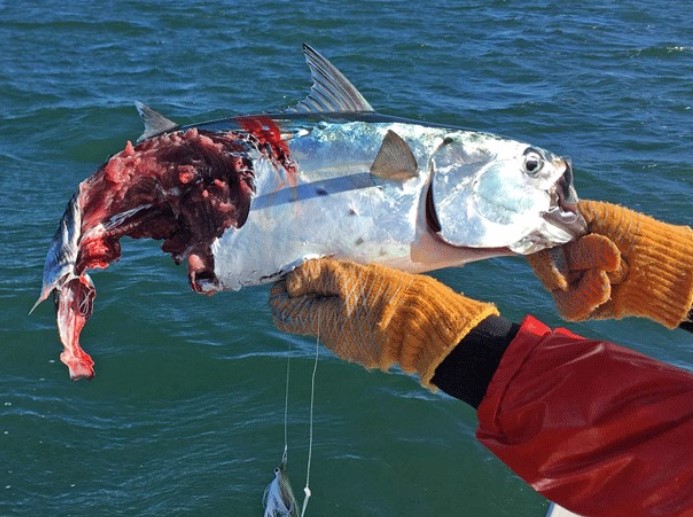
Has a shark, seal, or other predator snagged your hooked fish? Massachusetts researchers want to know
Has a shark, seal, dolphin, bird, or other predator snagged your hooked fish while fighting it on the end of your fishing line?
Researchers from UMass Amherst want to hear from fishermen about this growing concern for recreational anglers.
Depredation — the loss of an angler’s catch before the fish is reeled in — has become increasingly common as conservation efforts lead to more sharks, seals and other species along Cape Cod and the Northeast. Meanwhile, there are more fishermen out on the water.
As a result, local scientists are trying to better understand this issue along the Northeast continental shelf, from North Carolina up to Maine — and to possibly figure out some solutions to help out fishermen.
“These are interactions that anglers would have once in a while before, but it can happen multiple times on a single fishing trip now,” said UMass Amherst researcher Evan Prasky. “And it’s not just sharks. There are a lot of seals that are starting to do this.”
The seal population has been booming along the Cape after government restrictions many decades ago banned the killing of seals.
The seal population has since recovered, and that has attracted great white sharks to the region.
“When you combine the conservation success stories with the increase in fishing participation, the encounter rates are naturally going to be higher,” said UMass Amherst researcher Andy Danylchuk.
Over the summer off the Massachusetts coast, there were numerous reports of great white sharks taking striped bass at the side of fishermen’s boats. Many other predators have also been spotted taking hooked fish from anglers.
“Ultimately, it’s a matter of changing human behavior,” Danylchuk said of any potential solutions. “We don’t manage sharks and seals.”
One of the solutions could be fishing in areas away from areas where seals gather.
Also, reeling in fish faster might help. When scientists studied hammerhead sharks and tarpons in the Florida Keys, the researchers saw that depredation incidents dropped if the anglers brought the catch in quicker.
“It’s about getting the fish in your boat as soon as you can,” Prasky said.
Also, a technological solution could be shark deterrent devices — similar to what some surfers wear on their ankles to prevent shark bites.
The devices mounted on boats can create an electromagnetic field to keep sharks away. However, these devices aren’t effective against seals, birds and other animals.
Related Articles
Massachusetts North Shore beach closes to swimming after white shark sighting: ‘He’s moving’
Why are sharks coming to Boston Harbor? Researchers believe it’s a nursery ground: ‘A really cool success story’
Cape Cod sharks spotted 50 feet from shore: ‘White shark activity is just beginning to peak’
Peak shark season on Cape Cod is here, Greg Skomal tags more great whites: ‘Be shark smart’
It’s not just white sharks hunting for Cape Cod seals: Mako shark spotted chomping on seal
This research study is titled, “Assessing recreational angler experiences with depredation along the Northeast continental shelf of the United States.”
The scientists are looking to hear from anyone who’s 18-plus and has saltwater recreational angling experience from North Carolina to Maine. They’re interested in hearing from anglers of all skill levels.
“This survey/questionnaire will ask about your beliefs and actions regarding recreational fishing and depredation from North Carolina to Maine,” the survey reads. “The questionnaire will take you approximately 10-15 minutes to complete.”
At the completion of the study, participants can elect to enter a raffle for a Patagonia Guidewater Backpack. The survey will be open until the end of October.
The online research survey can be accessed at: umassamherst.co1.qualtrics.com/jfe/form/SV_cSBJ6y8khaAKRfg.
Captain Don Parker, of Prime Rate Sportfishing, holds the head of the striped bass that was chomped by a great white shark. (Photo by Gavin Varley)


